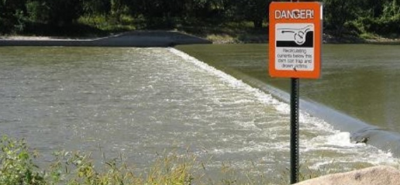
A low head dam
DES MOINES - The families of a mother and daughter who died after floating over a type of dam described as “drowning machines” can sue the State of Iowa and local governments for failing to maintain warning signs, the state’s highest court ruled.
A law extending immunity to government employees doesn’t apply to common-law tort claims, the Iowa Supreme Court said, meaning the case shouldn’t have been dismissed on summary judgment. The decision means the government defendants still may claim immunity under other provisions of the law but can’t avoid preparing for trial.
Sharon Kahn and her daughter Vicki Hodges were tubing on the Turkey River near Clermont in June 2020 when they went over a “low-head dam” built across the river just below the water’s surface. The state has called low-head dams “drowning machines” because they can create strong currents at the base that pull people underwater. Clermont has state funding to make its low-head safer.
The families of the victims sued Iowa and local governments, claiming four of the five signs warning of the danger were overgrown and couldn’t be seen from the river. A portage around the dam also was overgrown and inaccessible. The mother and daughter had never tubed the Turkey River before and thus were unaware of the danger of going over a low-head dam.
A trial judge dismissed the case, citing Section 670.4A of the Iowa Code, which allows quick dismissal of lawsuits claiming government officials violated someone’s constitutional or statutory rights. The Iowa Supreme Court reversed that decision in a June 13 opinion by Justice Matthew McDermott, citing earlier rulings that restricted 670.4 from applying to common-law tort claims.
The trial judge also granted summary judgment under the “public duty doctrine,” judge-made law that prohibits lawsuits over government actions or failure to act that affect the public at large. In this case, the government argued it didn’t have a specific duty to the mother and daughter to maintain the warning signs before the bridge.
State law also protects landowners against lawsuits over recreational activities, and while that law applies only to private owners, another statute provides similar protection to the government.
The Supreme Court rejected those arguments, too. The recreational activity law applies to “the normal and expected risks inherent in the recreational activity,” the court said, and only if the plaintiff “knew or reasonably should have known that the recreational activity created a substantial risk of injuries or damages.”
“The petition describes not simply a risk of drowning while tubing but a risk of drowning resulting from going over an unforeseen low-head dam while tubing,” the court concluded. “The estates have sufficiently alleged that low-head-dam drowning is neither a normal nor expected risk inherent in tubing and that Kahn and Hodges neither knew nor reasonably should have known that floating on a tube down a public water trail created a substantial risk of a low-head-dam drowning.”





